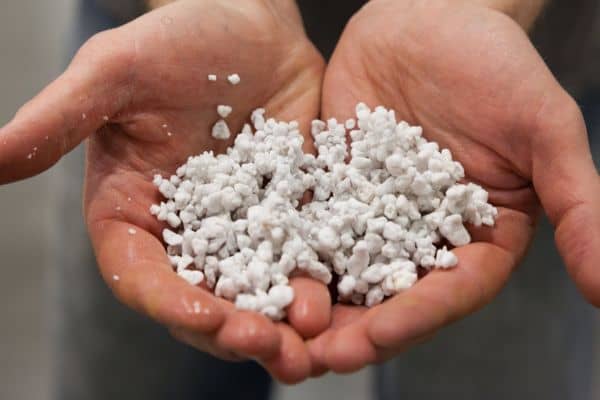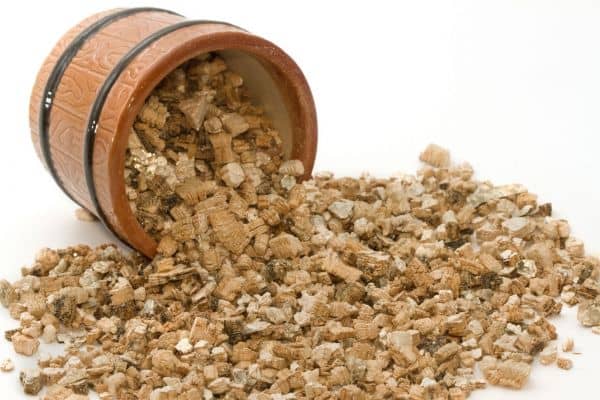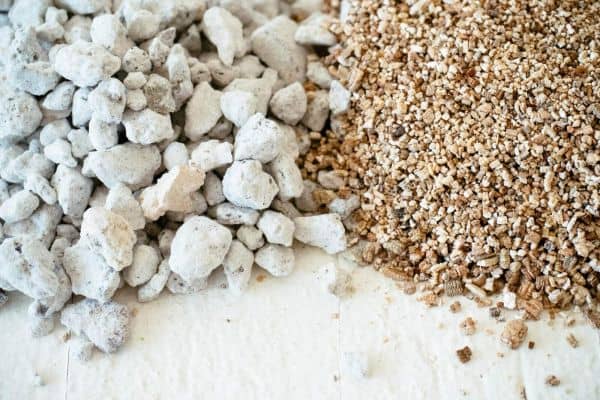Perlite and Vermiculite are natural minerals that help a lot during gardening. But they both have some advantages and disadvantages. So today we will be talking about how and when to use Perlite and Vermiculite and their advantages and disadvantages.
What is Perlite?
Perlite which is also known as volcanic popcorn is made out of amorphous volcanic glass. They form after the hydration of obsidian which is a white granular material that looks like popcorn and also pops itself when they expand.
Perlite is lightweight, and sterile, pH of 6.6 to 7.5, and is orderless. It is one of the well-known gardening products that helps to drain water quickly. It is mostly used to increase soil aeration, lightening the soil and giving better drainage and oxygen access for your plants’ roots.
Perlite also helps the gardener to reduce soil compaction as it is light and airy and keeps soils broken up effectively.

Advantages of Perlite
- Perlite can hold water up to its 3 to 4 times weight.
- Perlite is one of the best ways to start seeds as it retains more oxygen than other growing mediums.
- They can be reused provided it is steam-pasteurized and is one of the cheapest options.
- Perlite is one of the disease-free soil mediums as they are immune to microorganisms.
Disadvantages of Perlite
- Perlite is lightweight and most of the time it gets washed away and is not good in flood-and-flush hydroponic systems.
- They cannot retain water well during hydroponic systems.
- Perlite can be irritating to respiratory passages, skin, and eyes through its dust.
- Perlite can grow fungal gnats and have irrigation issues.
What is Vermiculite?
Vermiculite is a magnesium aluminum iron silicate mineral which is produced by heating. It interacts well in soil with potassium, calcium, and magnesium while creating a neutral pH of 7.0.
Like Perlite, Vermiculite is also a natural mineral that is made up of dry flakes of a silicate material that is absorptive and spongy. When water is mixed with vermiculite it expands into a worm-like shape and acts like an absorbing sponge it is also difficult to spot in soil as they are golden brown to a dark brown in color.
Vermiculite acts as a sponge so it absorbs more water than perlite and doesn’t aerate soil. It also provides less oxygen to plants’ roots than perlite. If vermiculite is used more the plant root rots as it creates dampness and plant diseases may develop as fungally appear.

Advantages of Vermiculite
- Vermiculite helps a lot to increase the soil structure, texture, water-holding capacity, and porosity and reduces erosion.
- It helps plants to increase productivity by improving the growth of new shoots and leaves rapidly.
- Vermiculite helps to keep the pH level of soil neutral at 7.0.
Disadvantages of Vermiculite
- Vermiculite takes a lot of time to do its magic on plants and soil from six to seven months.
- They have a noticeable odor like Perlite which doesn’t have any odor.
- Vermiculite is also high maintenance.
Difference Between Perlite vs Vermiculite
| Perlite | Vermiculite |
| They add drainage to the soil that they mix with. | They mix well with soils and help to retain water |
| Perlite can be used in seedings but needs to be moved in separate pots. | Vermiculite into many seed-starting systems while protecting from fungus. |
| They don’t have any odor for them. | They have an odor. |
| Its dust can cause irritation to respiratory passages, skin, and eyes | They don’t have dust and cant cause irritation to respiratory passages, skin, and eyes |
| Perlite needs to dry out before watering again | Vermiculite needs an additive for plants that need to be kept moist |
Perlite for Plants
Here are some of the important lists of Perlite for Plants:
- Perlite needs to dry out before watering again.
- Perlite is best if your plants need wee-drained soil or you can blend it with soil for potted plants.
- If you have to loosen the clay soil or compacted soil then you can use Perlite in your garden.
- If you have cut the plants then perlite is one of the great temporary mediums for rooting the plants.
- You can also use perlite if you have a damp climate where you need to promote soil drainage.
Vermiculite for Plants
Here are some of the important lists of Vermiculite for Plants:
- Vermiculite needs an additive for plants that need to be kept moist.
- You can also use vermiculite if you want your plants to develop strong seedlings during seed trays.
- If you are not using any type of moisture-holding material like peat moss, coconut coir, or worm castings in your garden you can use vermiculite.
- Vermiculite can also be great if you want to keep the surface of a seedling tray damp.
- Vermiculite is also great for short-term rooting if you are cutting the roots of your plants.
FAQs
Q. Which is best Vermiculite or Perlite?
Vermiculite and Perlite both are important in the field of gardening as they both have advantages and disadvantages. Both of them have importance through different terms and conditions.
Q. When not to use perlite?
Perlite can cause irritation to respiratory passages, skin, and eyes.
Q. Is Perlite Toxic?
Perlite is not very toxic but its dust can cause irritation to respiratory passages, skin, and eyes. So it is not a good choice for a greenhouse with fans or in windy places.
Also Read: Netflix’s ‘Hack My Home’ And The Tips You Can Use From The Show To Transform Your Place
